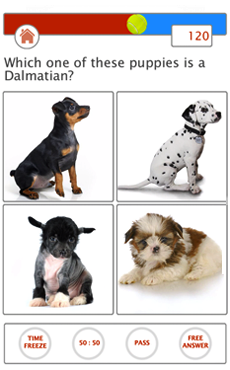Dog bereavement
| For many people, dogs are not simply pets, they are family members. The joy that comes with owning a dog can quickly turn to heartbreak when you lose a loyal companion. Dogs have a comparatively short life span and it can come as a shock when they die. Dog owners are seldom prepared for the grief they experience and can encounter a lack of sympathy from others who are not pet owners and do not understand. For many dog owners the loss of their dog is comparable to the loss of a friend or relative.
WHEN TO LET GO
Your vet will help you decide when and if the time is right to have your dog put to sleep. This decision can be difficult and distressing. Avoid making any rushed decisions that you might regret and discuss it with your family.
Reasons to consider having your dog put to sleep include; terminal illnesses which are not responding to treatment; A dramatic decline in health that has come with old age; Major un-treatable injuries.
Consider the quality of life your dog has. Is your dog able to eat and drink enough to maintain himself properly. Can your dog breathe without difficulty? Can your dog urinate and defaecate normally without discomfort or distress? Does he/she still have an enthusiasm for life? Is he/she playful and affectionate? Is he/she pain free?
Euthanasia means ‘gentle’ or ‘easy death’. A dog is euthanased by an intravenous injection of a barbiturate, usually in the foreleg - basically an overdose of anaesthetic. The dog should feel no more pain than the prick of the injection. In a few seconds the dog is completely unconscious and will not feel a thing as his breathing slows down. Cardiac arrest follows and he/she dog should pass peacefully away. Sometimes a dog will be given a sedative beforehand – particularly if he/she is upset by being at a veterinary surgery. Be prepared for what might come afterwards as it could be distressing - the body may have muscle spasms, there may be loss of bladder or bowel control, trembling or gasps.
Many owners will stay and comfort their dog during this procedure - although some people prefer not to as they find it too upsetting.
You may request for the procedure to be carried out at your home - particularly if you feel this will be less traumatic for your dog. If you dog is frightened of the vet, this is a good idea. It can be distressing to see the vet take your dog’s body away in a black plastic bag - but this may be a health and safety requirement.
If you are preparing for your dog to be euthanased - try to spend some time saying goodbye. Spoil him and indulge him in treats. Give him lots of TLC. Do all your favorite things, make some more good memories and make the most of your time left together.
If you have any concerns about your dog’s health, you should visit the vet as soon as possible. If problems are spotted early enough, treatment has a good chance of success. Discuss any financial concerns with your vet, who may be able to suggest less costly treatments and options. There are also some cases where financial assistance may be available.
GRIEF
A grieving pet owner will experience a variety of emotions. They may feel isolated if others around them have trivialised their loss. It is important to take as much time to grieve as necessary. For some the loss of a pet is the same as the loss of a friend or family member.
As with any death - it is widely acknowleged that there are five stages of grief. These include; Denial; Anger; Bargaining (the grieving person images how they could have prevented the death and ‘bargains’ with themselves); Depression; Acceptance. Learning about the grief process can help you recognise the emotions you are experiencing. You are not alone and these feelings are normal.
Guilt can plague some pet owners - particularly those who have made the tough decision to euthanase their dog. You must not beat yourself up if you acted with your dog’s best interests at heart.
The length of the grieving process can vary depending on the circumstances. Professional counselling can help the grieving person through the stages of grief towards acceptance. If you are struggling seek help if necessary, either through a bereavement counsellor or a support group. Locking grief away does not make it go. You must try to express your feelings. Remember, while it is a cliche, time is a healer.
When grieving some people can suffer from physical symptoms including disturbed sleep and loss of appetite, lethargy and anxiety including shortness of breath or tightness in the chest. Try to take care of yourself physically and pamper yourself. Get plenty of exercise and sleep and eat well.
Your pet was an integral part of your life and routine, sometimes even more so than friends and family. Your dog was completely dependant on you. The disruption to this routine can be heartbreaking. Chances are you will miss walking him, feeding him or letting him out. All these things will remind you he/she is gone. His belongings, like his bed and bowl will serve as further reminders. Do not get rid of them straight away, simply store them away. You might want to have them in the future. Try to make some changes to your routine to fill your time. Make plans with friends and family and do things which will distract you temporarily.
Holding a memorial for your dog can help the grieving process. This will give you the opportunity to reflect and mourn. It will also give you the opportunity to say goodbye. A memorial could be a funeral or gathering with close friends and family who knew your dog. It could be the creation of something which preserves your dog’s memory - such as a photo album or memorial stone. You could plant a tree or scatter his ashes. You could save one of his toys or tags and keep it on display. You could have a portrait painted. Whatever you see fit to remember your pet - preparing a tribute can be a cathartic process.
SEEKING HELP
Seeking help from a professional can be a difficult thing to do. You may trivialise your grief or feel that others will do the same. Some people are too embarrrassed or ashamed to ask for help, or they may not realise that they need it. Some people feel their grief is personal and may need to seek other ways to get help.
Help can be found through a bereavement counsellor or a support group. It can be comforting to talk to other pet owners who are going through the same thing. Some organisations even offer support groups and forums online. Help can also be found through understanding and supportive friends and family. Do not hide your feelings in an attempt to appear strong.
There are books and websites on pet bereavement available that can help you come to terms with your loss.
WHAT TO TELL YOUR CHILDREN
For many children, the loss of a beloved family dog is often their first experience with death. It is important to be supportive in a way which suits their age, and let them be part of any plans you have to memorialise him.
UK pet charity The Blue Cross, urges parents and teachers to be aware of the emotional impact the death of a pet can have on children. A child’s feelings may be underestimated or overlooked. The Pet Bereavement Support Service receive a growing number of phone calls each year from children grieving over the loss of a pet. Contact The Blue Cross and similar organisations for further specialist advice.
Children under six do not understand that death is permanent and older children may be curious and ask lots of questions. Explain gently, but be honest. Be clear that your dog will not return, but explain that he/she is free of pain and happy. Let them see you grieve too and talk about it.
GRIEVING DOGS
If you have a remaining dog and are concerned he/she may be pining, you will need to give him lots of love and attention. Dog can even pine for feline companions and vice versa.
There may be obvious changes in your dog’s behaviour - similar to those of a greiving person - that may lead you to believe he/she is upset. While your dog may not understand why, they will know their companion is missing.
Finding a replacement companion may not be the best immediate solution to comfort the remaining dog. You may also not be emotionally ready either. If or when you do introduce a new pet, remember your dog may not accept him straight away. Give it time.
Dogs like their routine. If helps make them feel safe and secure. While you cannot always communicate directly with your dog, they will find comfort from a routine where they can predict what will happen next. Stick to their normal routine as much as possible.
If your dog starts to suffer from anxiety when left alone, or starts being fussy about his food do not reward the behaviour - as this will reinforce it. Do not for example give him extra special food or extra attention if he/she plays up. Try to be calm and act as normally and routinely as possible - while being gentle and giving extra TLC where appropriate.
THE FUTURE
It is a good idea to wait for a while before aquiring a new dog. Wait until you have properly mourned and are ready to have a relationship with a new dog. Remember each dog has his own unique character. You cannot get your old dog back by replacing him with another.
If you do eventually decide to get another dog, perhaps consider getting a dog which is a different breed or looks different. Remember it might take time to bond with this dog.
If you feel it is too painful to get another dog. Consider other ways you can have a dog in your life. Consider volunteering at a dogs shelter or fostering. There are also charities where you can walk dogs for people who are struggling because they are sick or elderly.
Take care of yourself. Remember the pain of losing your dog was worth the joy he/she brought you. Try and remember these times with happiness.
|
- There are no comments yet








